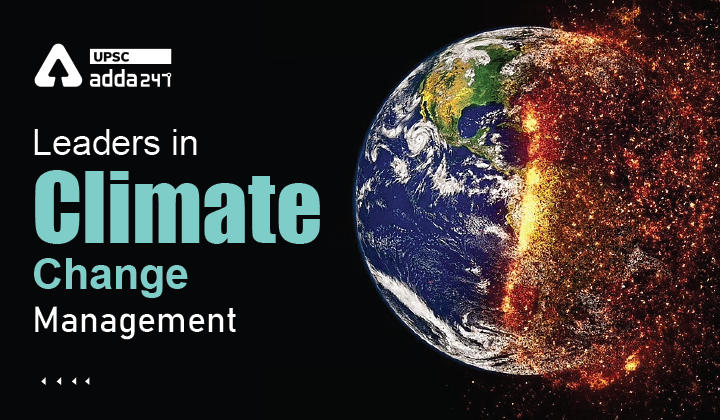Table of Contents
Leaders in Climate Change Management: Relevance
- GS 3: Conservation, environmental pollution and degradation, environmental impact assessment.
Leaders in Climate Change Management: Context
- Recently, Ministry of Housing & Urban Affairs has launched the Leaders in Climate Change Management Program to help urban professionals champion climate action in India.
Leaders in Climate Change Management: Key points
- ‘Leaders in Climate Change Management’ (LCCM) is a practice-based learning program that is launched by the National Institute of Urban Affairs (NIUA) and World Resources Institute (WRI) India.
- It aims at building capacity among urban professionals to lead climate action across sectors and geographies in India.
- To facilitate this face-to-face learning program, the Administrative Training Institute (ATI), Mysuru, also singed a tripartite Memorandum of Understanding (MoU) with NIUA and WRI India, becoming the first delivery partner of the LCCM program.
- LCCM envisions capacitating 5,000 professionals, including mid to junior-level government officials and frontline workers, and preparing them to champion climate change adaptation and mitigation solutions towards a coordinated effort to achieve India’s climate commitments.
About Leaders in Climate Change Management (LCCM)
- Leaders in Climate Change Management is a capacity-building program that seeks to build a pool of leaders to champion and lead climate action – across sectors and geographies.
- The program has been designed and implemented through core partners, being, National Institute of Urban Affairs (NIUA), World Resources Institute (WRI) – India, United Nation Environment Programme (UNEP), and Indian School of Business (ISB).
- LCCM is a blended learning program for urban practitioners looking to upskill and prepare themselves to deliver effective climate action.
- The program has four phases: the first phase- is an online learning module that can be completed over eight weeks; the next includes face-to-face sessions spanning four to six days; the third phase mandates participants to complete a project over six to eight months and attending exposure visits; and the final phase includes networking and establishing a community of practice.
- At COP26 last year, Prime Minister Narendra Modi proposed a five-fold strategy – Panch Amrit – to global leaders, extending India’s co-operation to meet the 1.5 degrees Celsius targets.
Panchamrit COP26
- First– India will reach its non-fossil energy capacity to 500 GW by 2030.
- Second– India will meet 50 percent of its energy requirements from renewable energy by 2030.
- Third– India will reduce the total projected carbon emissions by one billion tonnes from now onwards till 2030.
- Fourth– By 2030, India will reduce the carbon intensity of its economy by less than 45 percent.
- And fifth-by the year 2070, India will achieve the target of Net Zero. These panchamrits will be an unprecedented contribution of India to climate action.
Read current affairs for UPSC





 TSPSC Group 1 Question Paper 2024, Downl...
TSPSC Group 1 Question Paper 2024, Downl...
 TSPSC Group 1 Answer key 2024 Out, Downl...
TSPSC Group 1 Answer key 2024 Out, Downl...
 UPSC Prelims 2024 Question Paper, Downlo...
UPSC Prelims 2024 Question Paper, Downlo...
